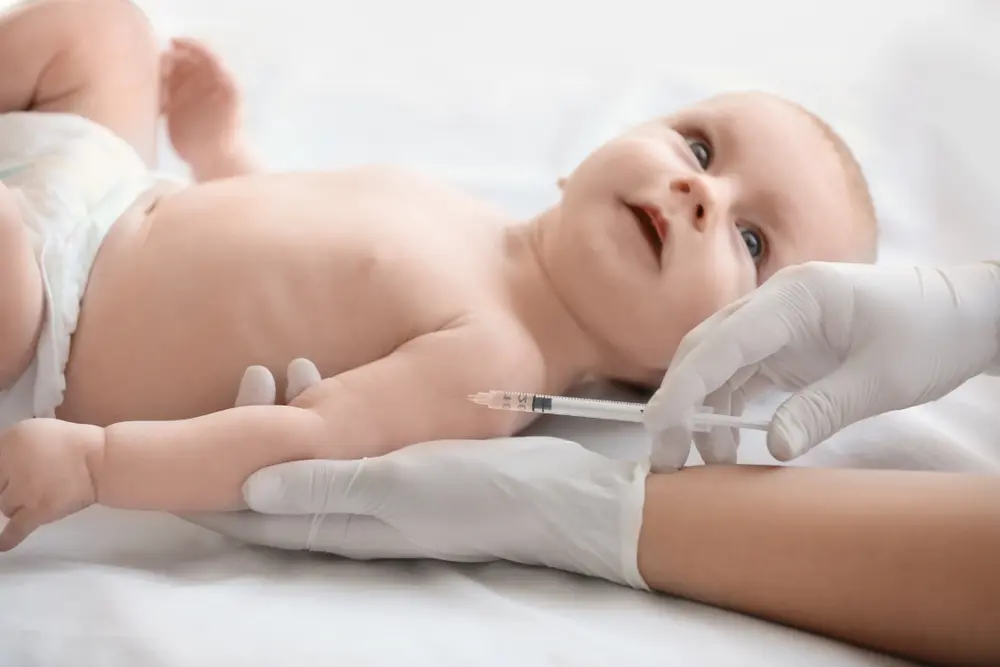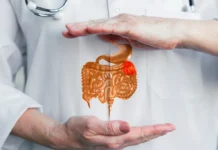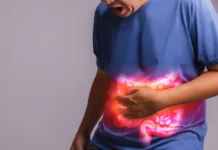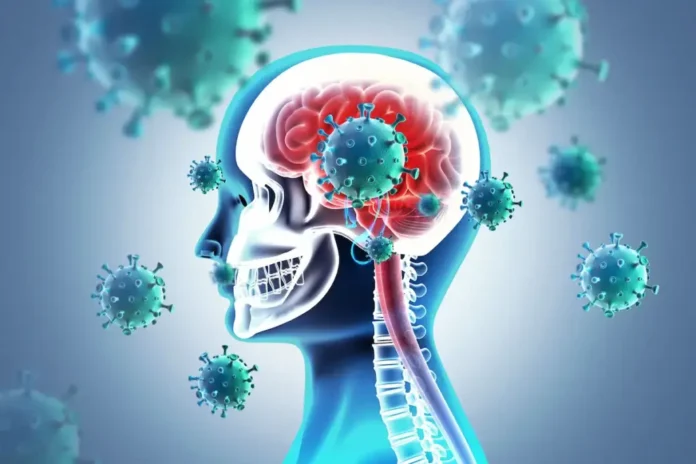The parents of a one-year-old girl who contracted a severe case of meningitis are urging others to ensure their children are vaccinated against the preventable disease.
Doctors said the toddler had most likely picked up a strain of bacterial meningitis that is uncommon in the UAE, and a vaccine against the infection is not part of routine childhood vaccination programs in the country.
Meningitis is a severe bacterial contamination and infection of the fluid and membranes surrounding the brain and spinal cord. Symptoms include headache, fever, nausea, and every so often a seizure, which may be especially risky in younger youngsters because of their developing immune systems.
Although the girl, Vienna, has made a full recuperation in the months since her infection, the surprising onset of symptoms and rapid deterioration in her fitness shocked her mother and father and brought about a week-long live-in hospital, which included emergency remedies in an intensive care unit.
Her dad and mom are now speaking out to elevate awareness of the sickness and the importance of vaccination.
We need different dads and moms to know that cerebrospinal fever is an actual and critical threat, even within the UAE, her mom stated. “We urge them to speak to their physician about getting their youngsters vaccinated.”
Meningitis Treatment: Safe and Effective Vaccination
The meningococcal vaccine is a secure and powerful way to defend against cerebrospinal fever as a result of the bacteria Neisseria meningitidis. The vaccine is suggested for all children at positive ages, as well as for adults at high risk for meningitis.
The most common, not unusual, side effects of the meningococcal vaccine are slight and depart on their own within a few days. These aspects can encompass redness, swelling, and aches on the injection web page, as well as headaches, muscle aches, and fatigue.
If you’ve got any questions about the meningococcal vaccine, speak to your health practitioner.
What is meningitis?

Meningitis is an irritation of the arachnoid membrane, the membranes that surround and guard the brain and spinal cord. It can be due to a range of factors, which include microorganisms, viruses, fungi, and parasites. Bacterial meningitis is the most critical kind and may be deadly if not handled right away.
Common causes of meningitis
The most common causes of meningitis are:
- Bacteria: Bacterial meningitis is the most serious type and may be caused by some specific bacteria, which include Streptococcus pneumoniae, Neisseria meningitidis, and Haemophilus influenzae kind b (Hib).
- Viruses: Viral meningitis is the most common form of meningitis and is normally much less severe than bacterial leptomeningitis. Some of the viruses that can cause meningitis include enteroviruses, mumps viruses, and herpes simplex viruses.
- Fungi: Fungal meningitis is uncommon and is normally seen in human beings with weakened immune structures, such as those with HIV/AIDS or rare cancers.
- Parasites: Parasitic meningitis is likewise rare and is commonly visible in individuals who travel to developing nations.
Transmission
Bacterial and viral meningitis can unfold through contact with respiratory secretions, including saliva and mucus. This can take place through coughing, sneezing, kissing, or sharing food or liquids. Fungal and parasitic meningitis are not typically contagious.
Meningitis risk factors
Anyone can get cerebrospinal fever, but certain groups of human beings have an improved chance. These consist of:
- Infants and young children: Babies below the age of 2 months are at the highest danger of bacterial meningitis.
- Teenagers and teens: Teenagers and young adults aged sixteen to 23 are in accelerated danger of meningococcal meningitis, a kind of bacterial meningitis resulting from the microorganism Neisseria meningitidis.
- Older adults: Adults over the age of 65 are also at extended risk of positive sorts of cerebrospinal fever, which include pneumococcal meningitis.
- People with weakened immune structures: People with weakened immune systems, together with people with HIV/AIDS, cancer, or diabetes, are at multiplied risk of all kinds of cerebrospinal fever.
- People residing in close quarters: People who stay in close quarters, which includes college students in dormitories or navy recruits in barracks, are at elevated risk of meningococcal meningitis.
- People visiting certain areas: People journeying to positive regions of the world, such as the African meningitis belt, are at increased risk of meningococcal meningitis.
Factors that can increase the risk of meningitis:
- Splenectomy: People who’ve had their spleen eliminated are at increased risk of pneumococcal leptomeninges.
- Certain medical conditions: Certain medical conditions, including sickle cell disease and cochlear implants, can increase the chance of cerebrospinal fever.
- Contact with a person who has cerebrospinal fever: People who’ve had near contact with someone who has cerebrospinal fever are in increased danger of developing the disorder themselves.
If you are at increased risk of meningitis, it is critical to be aware of the signs and symptoms of the disorder so that you can look for scientific interest early. If you experience any of the meningitis symptoms, it is critical to see a physician right away. Meningitis is a critical sickness, but early remedies can save lives.
There are vaccines to be had to guard against some forms of cerebrospinal fever, which include meningococcal meningitis and pneumococcal meningitis. If you have an increased risk of meningitis, talk to your medical doctor about getting vaccinated.
Spinal meningitis treatment
Spinal meningitis is an irritation of the subarachnoid space, the membranes that surround the mind and spinal cord. It can result from a variety of factors, consisting of bacteria, viruses, fungi, and parasites. Bacterial meningitis is the most serious kind and can be fatal if not treated directly.
Spinal meningitis can spread to the brain, causing a condition known as meningoencephalitis. This can cause severe complications, consisting of mind damage, seizures, and coma.
Symptoms of spinal meningitis
The symptoms of spinal meningitis can vary depending on the reason; however, they generally include:
- Fever
- Headache
- Stiff neck
- Backache
- Muscle aches
- Nausea and vomiting
- Sensitivity to light
- Confusion
- Drowsiness
- Seizures
Diagnosis of spinal meningitis
If you think that you or someone you recognize has spinal meningitis, it’s essential to seek clinical attention right away. A health practitioner commonly performs a physical exam and asks about your medical history. They may additionally order blood tests and a spinal faucet to verify the analysis and discover the cause of the infection.
Spinal Meningitis Treatment
The remedy for spinal cerebrospinal fever varies from person to person and depends on the cause of the contamination. Bacterial meningitis is treated with antibiotics. Viral meningitis typically goes away on its own; however, supportive care may be needed to manipulate signs and symptoms.
In addition to medicine, people with spinal meningitis might also want to be hospitalized for fluids, electrolytes, and other supportive care.
Prevention of spinal meningitis
There are several things you can do to reduce your risk of developing cerebrospinal fever:
- Get vaccinated against the bacteria that could cause cerebrospinal fever. There are vaccines to be had for Streptococcus pneumoniae, Neisseria meningitidis, and Haemophilus influenzae kind b (Hib).
- Practice true hygiene, which includes washing your hands regularly and keeping in close contact with people who are ill.
- Avoid sharing meals, beverages, and utensils with others.
- Be careful about touching animals, particularly wild animals.
If you are exposed to someone with tissue layer disease, talk to your doctor about the need for preventive antibiotics or vaccination.
Aseptic meningitis
Aseptic meningitis is a circumstance that causes inflammation of the tissue layer, the protecting membranes that surround the mind and the spinal cord. It is caused by a virus rather than bacteria. Aseptic meningitis is less unusual than bacterial arachnoid membrane disease; however, it’s also much less intense. Most human beings get better fully within 2 weeks.
Causes of aseptic meningitis
The most common cause of aseptic meningitis is enteroviruses, which might be a collection of viruses that still cause the common cold and other breathing illnesses. Other viruses that can cause aseptic cerebrospinal fever include:
- Herpes simplex virus
- Varicella-zoster virus (chickenpox)
- Epstein-Barr virus (mononucleosis)
- Mumps virus
- HIV
- Measles virus
Aseptic meningitis can also be caused by positive medicinal drugs, along with antibiotics and nonsteroidal anti-inflammatory capsules (NSAIDs). In some instances, the reason for aseptic cerebrospinal fever is unknown.
Symptoms of aseptic meningitis
The symptoms of aseptic meningitis can range in severity, but they generally consist of:
- Headache
- Fever
- Stiff neck
- Sensitivity to mild
- Muscle aches
- Fatigue
- Loss of appetite for food
- Nausea and vomiting
In some instances, human beings with aseptic cerebrospinal fever may additionally enjoy seizures, confusion, and coma.
Diagnosis of aseptic meningitis
Aseptic meningitis is identified primarily based on the affected person’s symptoms and the outcomes of a lumbar puncture (spinal faucet). A lumbar puncture is a method wherein a needle is inserted into the decreased lower back to collect a pattern of cerebrospinal fluid (CSF). The CSF is then examined for symptoms of infection and irritation.
Aseptic Meningitis Treatment
There isn’t a unique treatment for aseptic meningitis. Most humans recover on their own within two weeks. Treatment is generally targeted at relieving the signs and symptoms of the illness.
This might also consist of over-the-counter ache relievers, along with ibuprofen or acetaminophen, and rest. In some cases, patients may additionally need to be hospitalized for intravenous fluids and supportive care.
Complications for aseptic cerebrospinal fever
Serious headaches from aseptic cerebrospinal fever are rare. However, some feasible headaches include:
- Seizures
- Brain swelling
- Coma
- Hearing loss
- Hydrocephalus (a buildup of fluid within the brain)
Prevention of aseptic meningitis
There is no vaccine to save you from aseptic meningitis. However, there are steps that you may take to reduce your risk of having the viruses that cause aseptic cerebrospinal fever, including:
- Washing your palms frequently
- Avoiding close contact with people who are sick
- Getting vaccinated in opposition to different viruses, including measles, mumps, and rubella
If you have any worries about aseptic bacterial infections, please communicate with your health practitioner.
Meningitis vs. Encephalitis

Meningitis and encephalitis are both inflammatory conditions of the central nervous system; however, they affect one-of-a-kind parts of the brain and spinal cord.
Meningitis is an irritation of the cerebrospinal fever, the protective membranes that surround the mind and spinal cord.
Encephalitis is irritation of the mind itself.
Both conditions may be because of a range of things, including:
- Infection: The most common purpose of both arachnoid membrane disease and encephalitis is viral infection. However, each condition can also be caused by bacterial, fungal, or parasitic infections.
- Autoimmune sickness: In a few instances, cerebrospinal fever and encephalitis may be due to autoimmune diseases, such as lupus or more than one sclerosis.
- Cancer: Rarely, cerebrospinal fever and encephalitis may be caused by cancer.
What are the symptoms of meningitis?
Meningitis and encephalitis can have similar signs and symptoms, along with:
- Fever
- Headache
- Stiff neck
- Nausea and vomiting
- Sensitivity to light
- Confusion
- Drowsiness
- Seizures
- Skin rash (in some cases, such as meningococcal meningitis)
However, there are some key variations in the signs and symptoms of the two conditions. For instance, human beings with encephalitis are more likely to enjoy modifications in attention, which include confusion, delirium, or coma. They may also enjoy seizures or focal neurological deficits, such as weak points or paralysis in a single part of the body.
Symptoms of meningitis in children
In toddlers and younger adults, the signs and symptoms of cerebrospinal fever may be less apparent and might consist of:
- Fever
- Irritability
- Poor feeding
- Drowsiness
- A bulging fontanelle (the tender spot on the pinnacle of the top)
- High-pitched crying
Diagnosis of meningitis disorders
Meningitis is recognized by a lumbar puncture, which is a technique to acquire a sample of cerebrospinal fluid (CSF). The CSF is then tested for signs of infection.
To diagnose cerebrospinal fever or encephalitis, a doctor will typically perform a bodily exam and ask about the affected person’s medical history and symptoms. They might also order blood assessments, imaging assessments, or a lumbar puncture (a procedure to acquire a sample of cerebrospinal fluid).
Meningitis Treatment and Management
Treatment for meningitis and encephalitis depends on the underlying reason. If the condition is caused by contamination, antibiotics or antiviral medicinal drugs may be prescribed. In some cases, intravenous fluids and corticosteroids will also be used.
Meningitis treatment depends on its purpose. Bacterial meningitis is dealt with with antibiotics. Viral leptomeninges disease usually doesn’t require a remedy and goes away on its own within a few weeks. Fungal and parasitic meningitis is treated with antifungal or antiparasitic medicines.
If the circumstance is caused by an autoimmune illness or most cancers, the remedy could be targeted at managing the underlying circumstances.
Prognosis of meningitis
The analysis for cerebrospinal fever and encephalitis varies depending on the underlying cause and the severity of the condition. Most people with slight cases of cerebrospinal fever and encephalitis make a full recovery. However, more intense cases can result in complications such as brain damage, seizures, or hearing loss.
Prevention of cerebrospinal fever
There are a variety of things you can do to lessen your risk of developing cerebrospinal fever and encephalitis, such as:
- Getting vaccinated against viruses and microorganisms, together with Haemophilus influenzae kind b (Hib), Neisseria meningitidis, and Streptococcus pneumonia
- Wash your hands often with soap and water.
- Avoiding contact with people who are ill
- Practice precise hygiene, which includes covering your mouth while you cough or sneeze.
If you are experiencing any of the signs of meningitis or encephalitis, it’s crucial to search for clinical attention at once. Early prognosis and remedy can help enhance the outcome.
Risk factors for meningitis disorders
Cerebrospinal fever can cause some extreme headaches, including:
- Hearing loss
- Brain damage
- Seizures
- Coma
- Death
Early prognosis and meningitis treatment are crucial to reducing the threat of headaches.
Meningococcal vaccine recommendations for children

The Centers for Disease Control and Prevention (CDC) recommend that all children get the meningococcal vaccine in the following age groups:
- 11–12 years old: MenACWY vaccine (protects against four types of meningococcal bacteria: A, C, W, and Y)
- 16 years old: Booster dose of MenACWY vaccine
- 16-23 years old: MenB vaccine (protects against a 5th type of meningococcal bacterium: B)
The MenB vaccine isn’t automatically recommended for all children; however, it’s encouraged for positive youngsters and youth who’re at elevated risk for meningococcal disease, together with people with:
- A rare type of immune disorder called supplement component deficiency
- Certain scientific situations, inclusive of sickle cell sickness or asplenia (no spleen),
- Living in a household with a person who has meningococcal disorder
- Attending university or dwelling in a dormitory
Talk to your child’s health practitioner to see if the MenB vaccine is right for your toddler.
Note: The CDC recommends that children who acquire the MenB vaccine earlier than age 16 get a booster dose at age 16–23.
Additional information for meningitis treatment:
- The meningococcal vaccine is secure and effective. It can help protect your child from a severe and potentially life-threatening disorder.
- The meningococcal vaccine is given as a shot within the muscle.
- The most common side effects of the meningococcal vaccine are moderate and go away on their own within a few days. These side effects may also consist of aches, redness, and swelling at the injection site, as well as long-term headaches, fevers, and muscle aches.
If you have any questions or concerns about the meningococcal vaccine, communicate with your pediatric medical doctor.
Meningitis Treatment in the UAE
The occurrence of meningitis inside the UAE is fairly low, but it’s nevertheless a severe disorder that may be fatal if not dealt with promptly. In 2020, the UAE reported 51 instances of bacterial meningitis, 61 cases of viral meningitis, and 31 cases of other forms of meningitis. This is a price of about zero to five cases, according to a hundred,000 humans.
The most common form of meningitis in the UAE is viral meningitis, which is usually a result of enteroviruses. Viral meningitis is usually moderate and resolves on its own within a few weeks. Bacterial meningitis, however, is a more critical condition that requires prompt meningitis treatment with antibiotics.
What is the prevalence of meningitis in the UAE?
The UAE has a country-wide immunization program that consists of vaccines for numerous bacteria that could cause meningitis, including Haemophilus influenzae type b (Hib), Neisseria meningitidis, and Streptococcus pneumonia.
These vaccines have helped to reduce the prevalence of meningitis within the UAE; however, it is still vital to be aware of the signs and symptoms of this disorder and to seek scientific attention right away in case you suspect that you or a person you recognize might also have meningitis.
Meningitis Treatment: When to consult your doctor
You need to seek advice from your healthcare company right away if you are diagnosed with cerebrospinal fever. Bacterial meningitis is a clinical emergency and calls for a spark-off remedy. Meningitis due to viruses or fungi can also be extreme; however, it’s normally less urgent.
Here are a few specific instances in which you should consult your healthcare provider when you have been diagnosed with cerebrospinal fever:
- If your symptoms are getting worse, even when you start a remedy,
- If you develop new signs, including a rash, seizures, or trouble breathing,
- If you’ve got any issues with your meningitis treatment or healing,
It is also important to follow up with your healthcare issuer often when you are discharged from the hospital. This will ensure that you are getting better properly and that any complications are detected and dealt with early.
Essential Questions for Your Doctor
Here are some precise questions you may want to ask your healthcare company:
- What type of meningitis do I even have?
- What is the first-rate remedy for my sort of cerebrospinal fever?
- How long will I need to be handled?
- What are the capability-aspect outcomes of my remedy?
- What are the signs and symptoms of complications from meningitis?
- When should I meet up with you again?
If you’re diagnosed with cerebrospinal fever, it’s critical to take into account that you are not by yourself. Your healthcare issuer is there to help you through this hard time.
When to seek emergency meningitis treatment
Seek emergency care without delay in case you or someone else has any of the subsequent signs and symptoms of the meninx disease
Meningitis is an infection of the leptomeninges, the membranes that surround and guard the mind and spinal wire. It may result from several infections, such as bacteria, viruses, and fungi. Bacterial meningitis is the most severe form of cerebrospinal fever and can be life-threatening if not handled promptly.
The signs and symptoms of meninx disease can increase hastily, and the sickness can worsen quickly. If you’re experiencing any of the signs listed above, it is vital to try to find scientific interest at once. Early prognosis and remedy can help prevent severe complications and improve the outcome.
Additional reasons to seek emergency meningitis treatment
In addition to the signs and symptoms listed above, you need to look for medical emergency care for cerebrospinal fever if:
- You have recently been exposed to someone with cerebrospinal fever
- You have a weakened immune system.
- You produce other medical conditions, which include sickle cell disorder or HIV/AIDS
- You are pregnant
- You are younger than 2 years old
If you’re uncertain whether or not you must be looking for hospital therapy, it’s always nice to err on the side of caution and notice a physician. Meningitis is a critical condition; however, it’s far treatable if identified and handled early.
Other recommendations for meningitis treatment
Here are some recommendations for what to do if you assume you or someone you know has cerebrospinal fever:
- Call 911 or visit the nearest emergency room immediately.
- If you are able, attempt to get a list of all the person’s signs and any latest exposures to contamination.
- Be organized to reply to questions based on the individual’s scientific records and any medicines they are taking.
- If the person is unconscious, live with them and monitor their respiration and pulse until assistance arrives.
Prompt medical attention is crucial for people with cerebrospinal fever. With early diagnosis and meningitis treatment, most people achieve a complete restoration.














